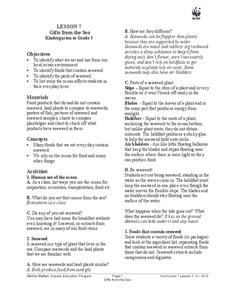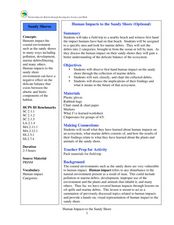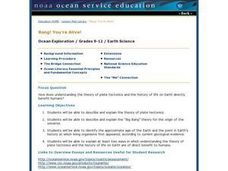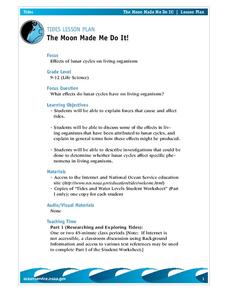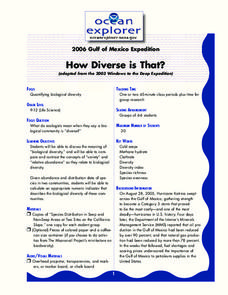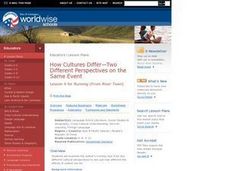Curated OER
Gifts from the Sea
Learners discover the oceanic food chain. In this healthy eating lesson plan, student investigate the fish we eat and the food the fish eat. Students discover what ocean animals eat seaweed and what everyday foods we eat that...
Curated OER
Human Impacts to the Sandy Shore
Students investigate human impact on coastal environments. In this coastal environment activity, students observe human impact on coastal environments. Students sort, classify, and chart marine debris collected on a local beach.
Curated OER
Bang! You're Alive
Students explore the Big Bang Theory and the Theory of Plate Tectonics. In this history of life lesson, students explain two ways the Theory of Plate Tectonics and the Big Bang are of direct benefits to humans.
Curated OER
Animals of the Fire Ice
Students examine ocean life by identifying methane hydrates. In this ocean life lesson, students research organisms that live in the coldest, deepest parts of the ocean and live off methane hydrates. Students create a group...
Curated OER
The Moon Made Me Do It!
Students research about how lunar cycles affect living organisms. In this biology lesson, students prepare an oral presentation of their research results and analyses. They explore the forces that affect tides.
Curated OER
It's a Gas - Natural Gas
Students use plastic bottles, water, and condiment packets to simulate how natural gas comes from decaying ocean plants and animals. In this natural gas lesson plan, students also fill out lab packets and answer exit questions.
Curated OER
Staying Up
Students will explain the Archimedes's Principle. In this lesson on plankton, students will describe three factors that can affect the buoyancy of plankton. This lesson contains extensive background information, extensions, and multiple...
Curated OER
Oceans-Coral Reefs
Second graders investigate coral reefs. In this oceanology lesson, 2nd graders discuss what constitutes a coral reef and the wildlife that lives there. Students watch a video about coral reefs and take an online quiz.
Curated OER
Living Light
Students explain bioluminescence. In this life science lesson, students discuss bioluminescence and conjure examples of organisms that carry this trait and how it is useful in their environment.
Curated OER
Saved by a Shark
Students explore the marine ecosystem and the importance of sharks. For this shark lesson, students look at photos of the Flower Garden Banks National Marine Sanctuary and discuss the animals that live there. They discuss which animals...
Curated OER
To Fish or Not to Fish?
Learners demonstrate the decision-making process for marine reserves designations. In this role-playing lesson plan students analyze maps and data relating to a proposed reserve. They formulate the best decisions based on overall issues.
Curated OER
Make Your Own Paper Bag Manatee Puppet
In this science craft worksheet, students learn about the Florida manatee by constructing a paper bag puppet with extra pattern pieces for the head and flippers. Students read the information and study the drawings about manatees, then...
Curated OER
Designing an Underwater Habitat for Humans
Learners consider the limitations of deep water oceanography and design an underwater habitat to support scientists while they complete long term studies under the ocean. In this engineering lesson, students are introduced to the...
Curated OER
Depth Line
Learners use adding machine tape to plot increasing ocean depths and deep sea historical events.
Curated OER
How Diverse is That?
Young scholars discuss biological diversity in ocean communities. In this diversity lesson, students examine the variety of organisms compared to relative abundance. They will write an analysis and discuss their findings with the class.
Curated OER
Can Photosynthesis Occur at Saturn?
Students identify the different requirements for photosynthesis to take place. In this space science instructional activity, students simulate conditions in Saturn to investigate if photosynthesis is possible there. They use data and...
Curated OER
Fishing for Solutions
Students investigate the many ecological and economic issues related to over fishing the world's marine resources. Working in committees, students research the related topics of equipment and fishing techniques.
Curated OER
Meet the Corals
Students investigate the types of coral. In this oceanography lesson, students access the Fisheye View Cam Website and create their own coral garden by using various art supplies.
Curated OER
Who Has the Data? Monitoring Coral Reefs
Students access data to characterize coral reefs. In this scientific research lesson plan, students access data and explain the need for such data when monitoring coral reefs. They will identify and explain three major threats to coral...
Curated OER
Ping!
Seventh graders study side-scan sonar and discover how it can be used to locate objects underwater. They complete a sonar simulation activity in which they create and map mystery landscapes inside shoeboxes.
Curated OER
Confronting Two Challenges-One Physical, One Intellectual
Students examine how the author confronted the challenges of a new language and a new culture. They examine how the author's penchant for running featured in his adjustment to the culture of Fuling and in his learning of the Chinese...
Curated OER
How Cultures Differ-Two Different Perspectives on the Same Event
Students examine the author's running race from two different cultural perspectives to see just how different the effects of culture can be. They practice thinking about an issue from different perspectives and create a script that can...
Curated OER
Desalination: Creating a Solar Still
To better understand how solar power can aid in creating desalinated drinking water, the class creates a model still. They will build a model of a solar still, make observations, and discuss how the process works. While the idea behind...
Curated OER
A Monument for Marine Conservation
Young scholars explore the Northwestern Hawaiian Islands to discover what's there and pick up clues as to how people have both harmed and helped the native habitats. They study another protected area and see how to balance conservation...


